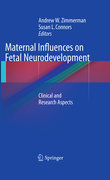
Maternal influences on fetal neurodevelopment: clinical and research aspects
Connors, Susan
Zimmerman, Andrew
This volume joins together research from various disciplines and demonstratesinterrelated and common themes that can direct current and future multidisciplinary research and clinical care. Of value to practitioners and researchers in the areas of pediatric neurology, obstetrics and gynecology, fetal physiology, neuroscience, genetics, developmental medicine, perinatology, toxicology and developmental psychology, as well as medical students, Maternal Influences on Fetal Neurodevelopment: Clinical and Research Aspects discusses a wide rangeof issues impacting several neurodevelopmental disorders. These include ADHD,autism, schizophrenia, bipolar disorder and obsessive-compulsive disorder. The altered developmental cell programs that lead to these disorders of functionare established during fetal life. Historically, these disorders have been individually classified and studied, and much of the research involved has focused on genetics and treatment, rather than mechanisms and causes. Thus, after several decades of sound scientific research, there are no recommendations for prevention and no known biological markers for medical diagnoses. Maternal Influences on Fetal Neurodevelopment: Clinical and Research Aspects provides a first step in elucidating the common themes that impact prevention, treatment and research issues surrounding fetal neurodevelopment. Research has shown that these neurodevelopmental disorders tend to cluster in families. In addition, relatives of people with these diagnoses often exhibit traits that are similar to those of the affected family members, but are milder and not disabling. Thus, genetic susceptibility obviously contributes to causing neurodevelopmental disorders, though despite good research, the genes involved have been difficult to isolate. Recent studies suggest that the fetal environment is the stagingground for these neurodevelopmental disorders and that they result from genetic susceptibility that may be modified by environmental influences during prenatal life. It is likely that a broad range of environmental factors, both intra- and extrauterine, affect cell programming in a genetically susceptible fetus, and result in abnormal brain function, but not form. These environmental factors may not only be external to the mother, such as toxins or drugs to whichshe might be exposed, but also maternal factors that have the potential to modify the intrauterine environment. These factors may include fluctuations in the pregnant mother’s thyroid or stress hormones, and circulating immune chemicals or cytokines produced in response to infection, among others. The study ofmaternal influences on the intrauterine environment as they relate to the developing fetal brain promises to be an important area of study in the future. This genre of research, though starting to expand, represents a relatively new way of approaching the causes of neurodevelopmental disorders. This specific area of study may make it possible to delineate the prenatal mechanisms that affect ongoing cell programming in the fetus and lead to neurodevelopmental disorders. In this way the investigation of factors affecting the intrauterine environment is important for diagnosis and prevention as well as later clinical care and treatment. Note: The Fetal Physiology Foundation is a federally registered non-profit organization, founded in 2003 to address the fetal origins of neurodevelopmental disorders that do not have a clear genetic cause. The goal in establishing this foundation was to support a research hypothesis proposingthat the cause of a neruodevelopmental disorder might not be singular or genetic but complex and involving multiple influences. This approach to the causesof neurodevelopmental disorders cannot be fully explored in one or even several studies and is not the focus of any other research organization. The mission of the FPF is to help prevent neurodevelopmental disorders by supporting scientific research into their prenatal origins. INDICE: Fetal Environment and Neurodevelopmental Outcomes, An Overview.- Prenatal Fetal Monitoring and What It can Tell Us About Outcome.- Maternal Exposure to Drugs and Future Susceptibility of Offspring to Environmental Factors.- Prenatal Exposure to Infectious Agents and Risk of Adult Psychiatric Disorders.- Maternal Immune Activation and the Developing Brain.- Maternal Thyroid Function and Fetal Brain Development.- Pregnancy Influences Maternal Vulnerability to Stress and Cognitive Function.- Fetal Neurobehavioral Development and the Role of Maternal Emotions.- Maternal Teratogenic Alleles in Neurodevelopmental Disorders.- Next Steps.
- ISBN: 978-1-60327-920-8
- Editorial: Humana
- Encuadernacion: Cartoné
- Páginas: 250
- Fecha Publicación: 01/07/2010
- Nº Volúmenes: 1
- Idioma: Inglés
